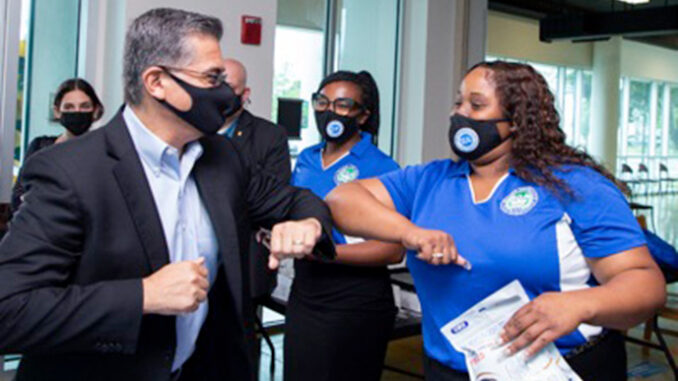
Data News Weekly Contributor
Photos courtesy Dillard University/Sabree Hill
U.S. Department of Health and Human Services Secretary Xavier Becerra visited New Orleans on Aug. 27 to raise attention to the Biden-Harris administration’s efforts to end the spread of COVID-19 and its variants, as part of the White House “Build Back Better” policy. Becerra spoke alongside community leaders in New Orleans on ways to improve “vaccine confidence.”
“We still got a lot of folks out there who if they just had a chance to really connect with folks and hear it with confidence and trust, they’d get vaccinated,” Becerra said at the panel held at Dillard University. “And here is the beautiful thing, we have a president that actually wants us to spend the resources to find those things, and we haven’t always had leadership that had wanted to reach out to corners of the country that are often left behind.”
The event included participation from Assistant Secretary Dawn O’Connell of the U.S. Office of Preparedness and Response for the HHS, U.S. Rep. Troy Carter D-La., Dillard University President Walter Kimbrough and Xavier University of Louisiana President Reynold Verret. During the panel, Dillard University held “Pathway to Normalcy,” a free COVID-19 vaccination drive at its Student Union and Health and Wellness Center. The HHS secretary visited the vaccination drive before speaking with members of the public.
“This Secretary has a very, very robust schedule with a lot of things going on but didn’t hesitate, didn’t blink when given the opportunity to come to New Orleans, to come to Louisiana to express his support,” Carter said.
Prior to visiting Dillard University, Becerra stopped by Children’s Hospital New Orleans LCMC Health to see their COVID-19 response in action. Recently, the federal government sent a“surge team” to the Children’s Hospital to help with round-the-clock care for children in the ICUsuffering from COVID-19. In Louisiana, 81,312 of COVID-19 cases reported are for those in the5 to 17-year age group, according to data from the Louisiana Department of Health. The LDH reports show that despite 5,355,460 doses of the COVID-19 vaccine being administered in the state, only 40.88 percent of residents are full vaccinated. Those who are not fully vaccinated account for 91 percent of COVID-19 hospitalizations in Louisiana.
Becerra said he wanted to hear from the community about how they could bring equal opportunities of receiving the vaccine to different groups. Medical professionals in various fieldsgave their opinions on how to build “vaccine confidence” in certain communities. Suggestions were made about the federal government having a more centralized message about vaccines to members of the public. Many in healthcare explained that a rise in misinformation has caused many of their patients to doubt their expertise.
For millennials and Generation Z, both university presidents shared how vaccine mandates have increased safety on their campuses. Dillard’s Bleu Troop, for instance, is a student-led initiative for preventing COVID-19. And both universities have required their students to be vaccinated in order to live on campus and attend classes this school year.
“We’re excited to be able to host [the] Secretary here as well as our Congressman for thisconversation about how we continue to work through this pandemic,” Kimbrough said. “I think alot of work has been done in this city and this state through a lot of coordination from the governor, the mayor, and our representatives in Congress.”
The Centers for Disease Control and Prevention rank Louisiana as 48th in the nation for vaccination rates. Despite this, the city of New Orleans has the highest ranking in the state for vaccination. According to NOLA Ready, 74 percent of all adults are fully vaccinated in New Orleans.
During the discussion, different faith-based leaders explained to Becerra that Black churches in New Orleans have been crucial for getting the community vaccinated. Numerous vaccination drives and door-to-door campaigns were hosted by churches in order to raise vaccination rates. After hearing about how Black churches have been encouraging their congregations to vaccinate, Becerra questioned whether or not a similar approach was being taken at churches with predominantly Hispanic congregations.
The panelists also discussed who are the best representatives that could reassure the community about the COVID-19 vaccine. Community outreach spokespersons suggested delivering the message through trusted healthcare providers such as community health centers.
“I told my team at HHS that there are three principles we’re going to operate under: transparency, equity, and accountability,” said Becerra on reaching different communities.
“Equity has usually not been part of the mission of too much of government, and if we’re going to do this right, we’re going to have to hear from the folks that know how to reach the communities that are often left behind.”
Becerra said he was hopeful that younger and non-traditional voices would work to ensure that their peers received the COVID-19 vaccine.
“If we’re going to reach some of those people that don’t sit at the table, we’re going to need your help,” Becerra said.
“Here’s my challenge to you: give me an idea where I would harness the young folks, I would harness some of the folks that would never get to be in this meeting,” he said.
Recommended For You.



Be the first to comment